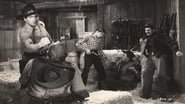Michael Morrison
Two photography errors, toward the end, and one silly script flaw do little to lessen the pleasure of this Johnny Mack Brown oater.Brown was an extremely likable hero, and a good actor, and further proof of that assertion is available in any of his pictures, including his earliest performances."The Gambling Terror" has a clever-enough plot with a different-enough setting but all the action a B Western connoisseur could want. Heck, Charlie King and Earl Dwire are both in it!And they're not all: So are Dick Curtis and Bud Buster. And several other excellent cowboy bad guys and townsmen.Iris Meredith is a strong performer, as is young Bobby Nelson, and they provide their characters enough personality to make the action they cause more than believable.The script flaw comes in some business by the printer's devil drunk, very well played by Horace Murphy. Try to ignore it. (This and a few other negatives made me mark my rating down from a 9 to an 8 -- which is still pretty darn good.)And some more silliness right at the end is pretty bad, but watch Brown's face. How can you not like him?"The Gambling Terror" is available at YouTube, and I hope you get a better print than the one I saw. It's a good movie, that, yes, could have been better, but it has so much going for it you will be glad you clicked on it.
classicsoncall
'Or above my pay grade' if the story was written today. For a B Western, this one had more than it's share of memorable lines, clichéd though many of them were. There's an early one coming from the hero himself (Johnny Mack Brown) before we learn his real identity - "The law can't help folks who won't help the law". Brown's character Jeff Hayes is on call by the local sheriff (Ted Adams) to help smoke out a band of outlaws posing as the local 'Protective Association'. So you have a pretty good idea where this one is going.Not generally known for moments of tenderness, this old Western flick surprised me with a heartwarming scene when Hayes saved the old couple from henchman Dirk (Dick Curtis). Hidden in the hankie that Hayes handed the old man was the money to replace what was taken by the outlaws. The old couple's reaction was almost a tearjerker moment if the action didn't keep moving right along.On the flip side though, I was surprised to see Hayes stick up for Dirk, Blackie (Frank Ellis), and a third henchman following the shooting of editor Garret (Frank Ball). Thinking about it now, I don't think it was revealed who actually did shoot Garret. But if daughter Betty (Iris Meredith) had her way, all the bad guys in the protection racket would have gotten a vigilante inspired hanging by the town's good citizens. Talk about two extremes!"The Gambling Terror" breezes by pretty quickly, shy of an hour by a full seven minutes. With the economical format, it's a pretty good ride for the hero who confounds the bad guys at every turn. In true B Western fashion, the hero gets the girl by the end of the picture, even if he weren't trying all that hard to begin with.
rsoonsa
Producer A. W. Hackel completed twenty-four B-type Westerns for his own penny pinching Supreme Pictures Corporation, most characterized by a basic linear storyline with this Johnny Mack Brown vehicle being true to the type, as well as one of the best, with Brown cast as Jeff Hayes in a unique role: operator of a traveling gambling operation, upon this occasion setting up his roulette wheel, poker tables, and other tools of the trade in the back room of a saloon, queerly enough encouraged to do so by the town's sheriff who is requesting assistance from old friend Hayes in a struggle against a local criminal group. This is a self-styled "cattleman's association", collective villain of the melodrama, essentially a protection racket that demands "dues" from anyone owning one or more head of cattle. It is managed by Brett (Charles King) although the actual boss of the organization is not revealed to its various henchmen, of whom "Dirk" (Dick Curtis) is the foremost collector of the mandatory membership fees. Garrett (Frank Ball), publisher of the town's newspaper, is determined upon restoring freedom of choice to victims of the blackguards by utilizing the power of the press, and therefore is busily gathering resistance from among the hapless citizens impelled to pay for "protection"; however, he and his daughter Betty (Iris Meredith) do not trust Hayes due to his gambling vocation, and when Jeff ostensibly becomes a member of the vicious gang, it would seem that any negative opinion of him has been validated. Brown is impressive from his initial scene, both as actor and horseman, through the film's finale, while there is solid support turned in from Curtis and Meredith. A substantial assemblage of skillful Western supporting players is effective for this production by avoiding the omnipresent risk within this genre of cardboard characterization, while a well constructed script and the brisk editing of Roy Luby add value to this action propelled adventure tale.



